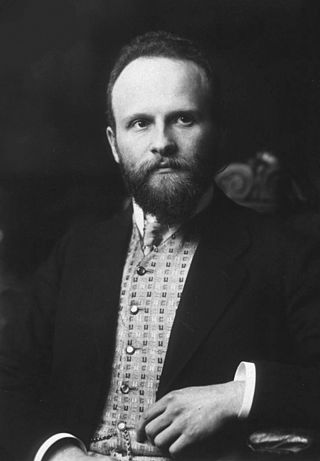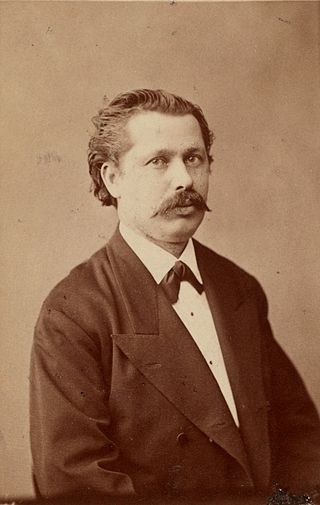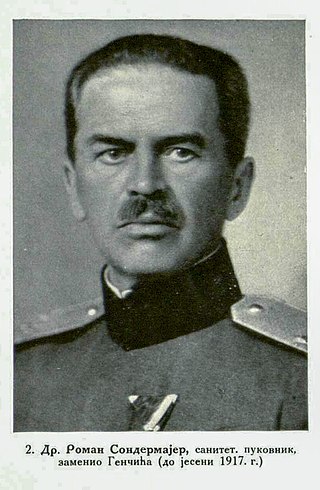
Arthur Schnitzler was an Austrian author and dramatist. He is considered one of the most significant representatives of the Viennese Modernism. Schnitzler’s works, which include psychological dramas and narratives, dissected turn-of-the-century Viennese bourgeois life, making him a sharp and stylistically conscious chronicler of Viennese society around 1900.

Aktion T4 was a campaign of mass murder by involuntary euthanasia in Nazi Germany. The term was first used in post-war trials against doctors who had been involved in the killings. The name T4 is an abbreviation of Tiergartenstraße 4, a street address of the Chancellery department set up in early 1940, in the Berlin borough of Tiergarten, which recruited and paid personnel associated with Aktion T4. Certain German physicians were authorised to select patients "deemed incurably sick, after most critical medical examination" and then administer to them a "mercy death". In October 1939, Adolf Hitler signed a "euthanasia note", backdated to 1 September 1939, which authorised his physician Karl Brandt and Reichsleiter Philipp Bouhler to begin the killing.

Robert Bárány was an Austrian-born otologist. He received the 1914 Nobel Prize in Physiology or Medicine for his work on the physiology and pathology of the vestibular apparatus.

Uncle Vanya is a play by the Russian playwright Anton Chekhov. It was first published in 1897, and first produced in 1899 by the Moscow Art Theatre, directed by Konstantin Stanislavski.

The history of the Jews in Austria probably begins with the exodus of Jews from Judea under Roman occupation. There have been Jews in Austria since the 3rd century CE. Over the course of many centuries, the political status of the community rose and fell many times: during certain periods, the Jewish community prospered and enjoyed political equality, and during other periods it suffered pogroms, deportations to concentration camps and mass murder, and antisemitism. The Holocaust drastically reduced the Jewish community in Austria and only 8,140 Jews remained in Austria according to the 2001 census. Today, Austria has a Jewish population of 10,300 which extends to 33,000 if Law of Return is accounted for, meaning having at least one Jewish grandparent.

Adjoa Aiboom Helen Andoh HonFRSL is a British actress. On stage, she has played lead roles with the Royal Shakespeare Company, the National Theatre, the Royal Court Theatre and the Almeida Theatre. On television, she appeared in two series of Doctor Who as Francine Jones, 90 episodes of the BBC's long-running medical drama Casualty, and BBC's EastEnders. Andoh made her Hollywood debut in autumn 2009, starring as Nelson Mandela's Chief of Staff Brenda Mazibuko alongside Morgan Freeman as Mandela in Clint Eastwood's drama film Invictus. Since 2020, she portrays Lady Danbury in the Netflix Regency romance series Bridgerton. In July 2022, Andoh became an honorary fellow of the Royal Society of Literature.

Bartholomäus Bernardi (1487–1551) was the rector and a professor of physics and philosophy at the University of Wittenberg during the time of Martin Luther. He was a student of Luther's.
Paul Herzberg is an actor and writer, known for The Honourable Woman (2014), Black Earth Rising (2019), My Week with Marilyn (2011), Room 36 (2005), Blood and Cry Freedom (1987).
Mariah Gale is a British actress of film, stage and television.

Eduard Bloch was an Austrian physician practicing in Linz, who, for many years until 1907, was the family doctor of Adolf Hitler and his family. When Hitler's mother, Klara, was dying of breast cancer, Bloch billed the family at a reduced cost and sometimes refused to bill them outright. An Austrian Jew, Bloch was awarded special protection by Hitler who personally intervened to ensure his safety following the German annexation of Austria in 1938. Following Kristallnacht and the escalation of anti-Jewish sentiment in Germany, Hitler allowed Bloch to emigrate to the United States, where he lived until his death in 1945, succumbing to stomach cancer.

Johann Schnitzler was an Austrian Jewish laryngologist and professor. He was the father of Arthur Schnitzler.
Physician writers are physicians who write creatively in fields outside their practice of medicine.
Samuel Adamson is an Australian playwright and screenwriter who has lived and worked in the UK since 1991. He was born in Adelaide and lives in London.

Professor Mamlock is a theater play written by Friedrich Wolf in 1933. Portraying the hardships a Jewish doctor named Hans Mamlock experiences under the Hitler regime, it is one of the earliest works dealing with Nazi antisemitism.

The Winkler County nurse whistleblower case was a series of legal proceedings in West Texas concerning the retaliation against two nurses who submitted an anonymous state medical board complaint against a physician in 2009. The case attracted national attention for its implications on whistleblowing by nurses.
Robert Icke is an English writer and theatre director. He has been referred to as the "great hope of British theatre."

Colonel Dr. Roman Sondermajer CMG was a Royal Serbian Army physician who served as Chief Surgeon of the Royal Serbian Army, Chief Surgeon and Director of the Military Hospital and Chief of the Medical Staff of the Serbian Supreme Command during World War I.

Die Gefährtin is a one-act play by Arthur Schnitzler, which premiered on 1 March 1899 at the Burgtheater in Vienna. In the same year, S. Fischer in Berlin published the text edition together with the one-act plays Der grüne Kakadu and Paracelsus.
The Doctor is a 2019 play by Robert Icke. It is a reimagining of the 1912 play Professor Bernhardi by Arthur Schnitzler.

The General Polyclinic was a hospital in Vienna where many well-known Austrian physicians worked.













